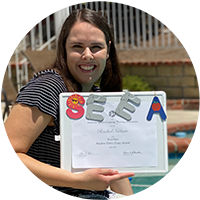As you prepare to start your CSD career, it’s important to think about how ethical decision-making will be a part of your everyday experience. To create a greater awareness of situations that could pose ethical dilemmas throughout your career—and to get you thinking about how to handle these situations—ASHA established the Student Ethics Essay Award (SEEA) program.
Submissions are now being accepted for this year’s SEEA competition and are due April 9 [psst … you could win a 1-year membership to National NSSLHA, registration at this year’s ASHA Convention and up to $1,000!].
But before we talk more about that, let me tell you about last year’s winners …
Cultural Competence in Service Provision: Ethical Considerations
Last year, students were asked to write an essay that presented an ethical dilemma or challenge related to differing perspectives (related to cultural and linguistic diversity) faced by a clinician when providing services to clients and their families. Using ethics resources and the ASHA Code of Ethics (2016), they were asked to
- identify one or more Principles and corresponding Rule(s) they believe had been violated,
- provide rationale for their choice(s), and
- discuss what action(s) they’d take to resolve the dilemma.
Winning Essays
Check out what ASHA’s 2020 SEEA winners had to say about this topic:

1st Place: Rachel Nelson, California State University, Fullerton
The Power of Communication: Implementing the Skills We Teach
“. . . it is our responsibility to seek to provide the best care to all of our clients by taking into consideration their “unique combination of cultural variables and the full range of dimensions of diversity”. Each client that comes into contact with an SLP is unique and has their own set of culture and values that must be considered in all interactions. As SLPs, it is not only our job to help others communicate, but for us to communicate well to provide the best possible care for all clients.”

2nd Place: Audrey McMillion, University of North Carolina, Chapel Hill
The Ethics of Providing Interpretation and Translation Services for IEP Meetings
“When speech language pathologists make their clients’ and students’ needs a priority, they behave in a morally and ethically upright way.” In her example, Audrey showcases how one SLP can act as a role model for other professionals in the school setting.

3rd Place: Sarah Masters, University of Kentucky
Implicit Bias Affecting Cultural Competence in Service Provisions: Ethical Considerations
“SLPs work to treat a variety of communication, language, swallowing, and speech disorders for people of all ages. In order for an SLP to diagnose, assess, or interpret an individual’s present means of communication, they must consider the patients linguistic and cultural differences. A language difference does not equal a language disorder, yet it is relatively common that children are misdiagnosed with a language disorder, when in fact they only present with a language difference. . . When clinicians are providing services for a client and their family, they must understand the distinction between a language difference and disorder, in order to ethically approach a client who is culturally and linguistically diverse.”
Prepare Yourself
As future audiologists and speech-language pathologists, and holders of ASHA Certificate of Clinical Competence (CCC), it’s important to be prepared and think now about how you’ll approach ethical dilemmas as a professional. Once your certification application is received at ASHA, you become an official “applicant” for the CCC and under the jurisdiction of the Board of Ethics—so, it’s never too early to become familiar with ASHA’s Code of Ethics!
Get started on your submission now—it’s due by 11:59 a.m. (EST) on April 9, 2021!

